Within the highly competitive telecom industry, customer experience is crucial in maintaining and developing an advantage over other companies.
Article Index
For this process to be completed successfully, personalization is key. This is achieved by understanding the situation and context of each consumer to enhance those interactions.
What are the big challenges for telecom operators?
- More simplicity inside the business, with more accessible and streamlined processes.
- More simplicity in customer relations, solving any issue at the customer’s preferred channel and touchpoint.
- More simplicity for increasing revenue, offering added value services as a natural wrapper for existing services.
- More sophisticated experiences, making the most of data and artificial intelligence to offering completely personalized services and content to each customer.
What is the role of VASS in all this digital transformation that Telco’s are experiencing?
Our great differentiator is the way we help Telco Operators transform the customer journeys they provide to their customers. At VASS we work with over 30 companies in the Telco industry at a global level to respond to consumer’s needs at every stage of the customer journey.
We do so through the latest technologies and business solutions that help and optimise the different areas of the operators’ processes. These range from customer acquisition, marketing and sales processes to post-sales and customer service processes, ensuring that all information systems can change quickly and dynamically and evolve constantly.
Magnetic and Infinite, the Key to Success for New Business Models
Beyond voice and data, operators seek other models: firstly, to generate more revenue, and secondly, to offer more services to customers and build customer loyalty.
To do so, they must look for magnetic and infinite business models, i.e. attractive and appealing on the one hand and scalable and capable of unlimited customer growth on the other.
In this respect, at VASS, we help operators to enter new businesses such as the World of Things or the banking business, for example, or to maximise their business as retailers, creating sales platforms so that they can offer new products to their customers.
Agile Digital Telco as a customer-centric solution
Operators want to be faster and more agile. And that is precisely our value proposition, “Agile Digital Telco” – to offer companies a rapid adaptation, and the simpler and straightforward it is, the better. A vital element of this value proposition is to be customer-centric, ensuring that whatever the operator develops for the customer will only be useful if the customer values it and uses it. Using channels as personalized as possible is fundamental to all of this.
Operators are also seeking flexibility to offer new services so they can increase the value and number of contracts with customers, both for B2C and B2B segments.
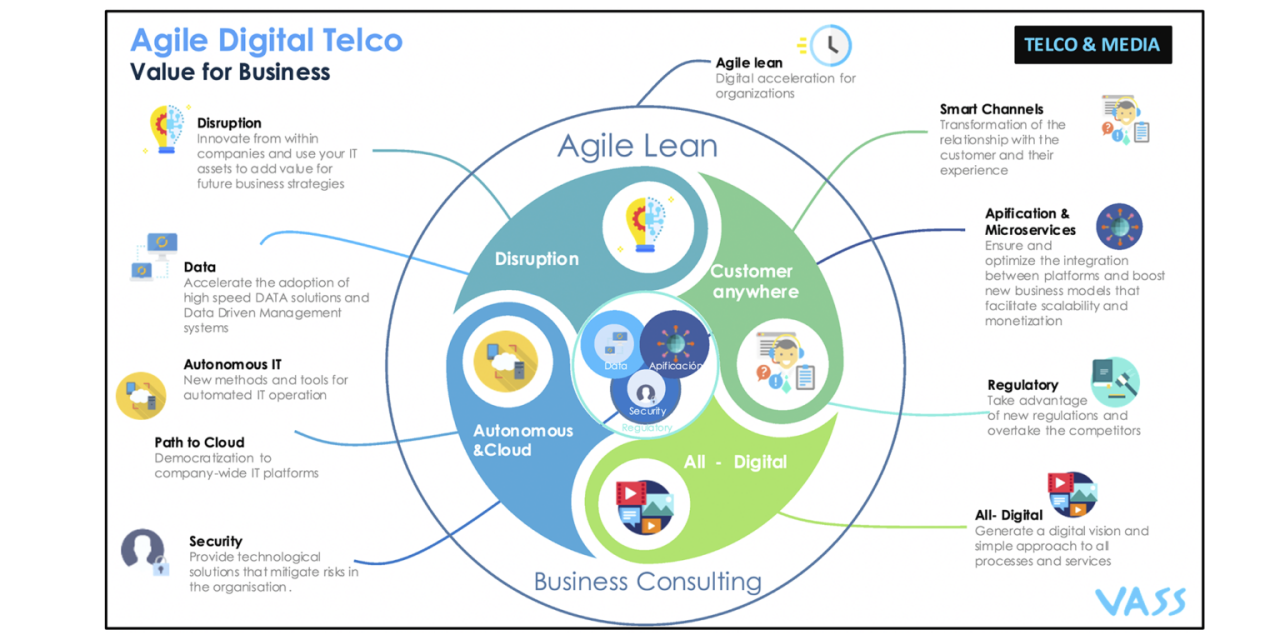
Operators are trying increasingly to escape from being a commodity model, which provides very little value to their customer, so, what do we offer them to become agile digital telco operators? Emotion-based content, flexibility to provide services and products faster and use cognitive techniques to anticipate what the customer is looking for at any given moment.
Keep reading more to see the value proposition dedicated to smart channels.
What is VASS Smart Channels solution?
This is our leadership solution. From sales platforms based on emotional selling, to eCommerce and TV channels, customer service and eCare portal and apps, loyalty platforms, and everything related to customer engagement with marketing automation. We are currently implementing the digital channels for the most important world-wide Telco Groups like Telefonica, both Movistar and Tuenti brands, Vodafone or Millicom Group.
Leading Telco Experience Sharing
Through a unified platform, the operators manage their customers’ experiences in a personalized way. The customer is able to find every need through an omnichannel experience.
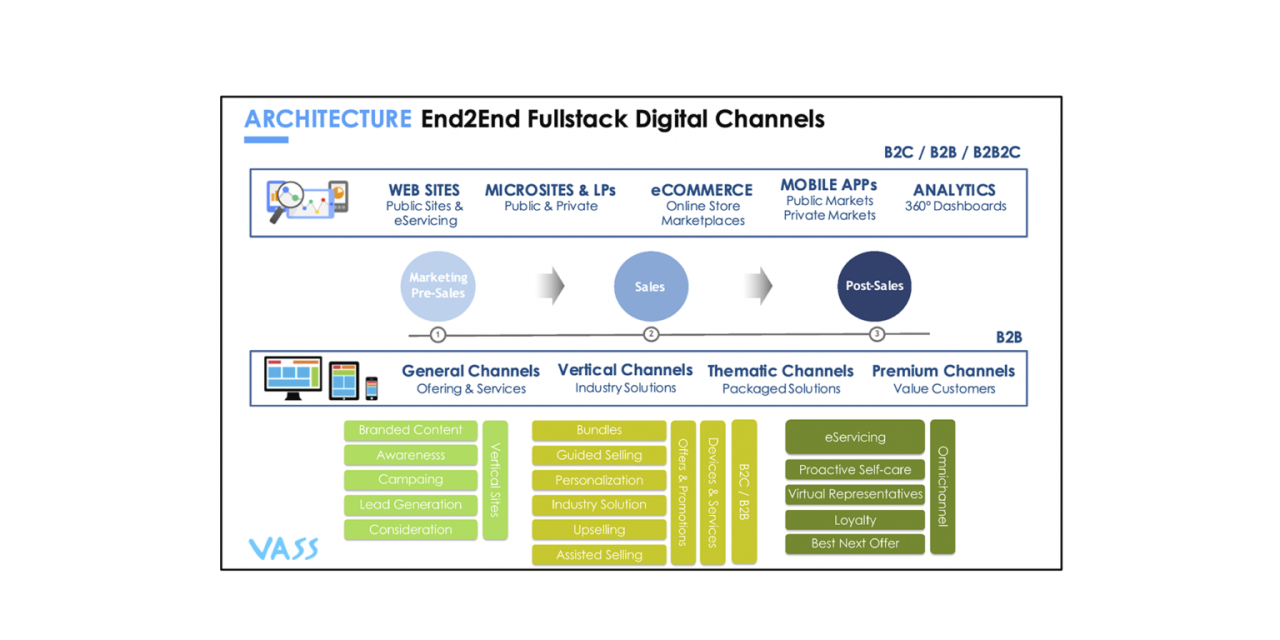
1. Smart Trading Platform – A direct channel for emotional selling
Discover “the tinder of phones”, a direct and emotional channel based on the user experience. Users swipe left and right on offers, right being a like and left a dislike.
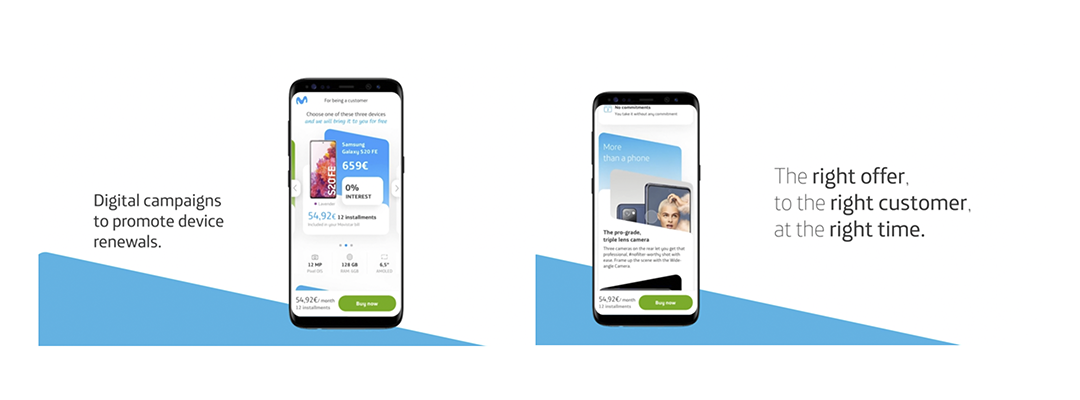
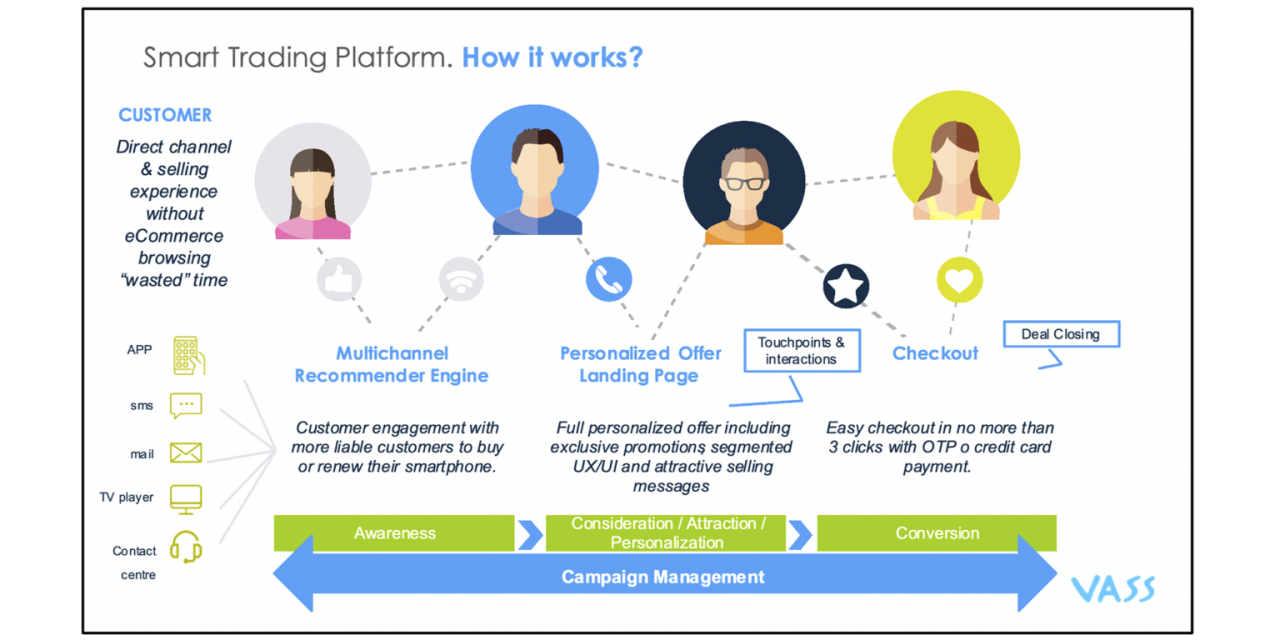
Firstly, It is a direct channel to create attractive offers adapted to the consumption patterns of each region. Secondly, it improves Customer Experience and brand perception by delivering a unique and personalized user experience and maximizing brand value across all channels. Thirdly, it maximizes customer service quality and optimize retention and loyalty. Finally, “Phoenix” meets customer expectations in their experience with Telefónica by proposing personalized offers.
2. The Movistar Peru success story
There is one sure way to enhance customer loyalty, and that is through the customer loyalty app for Movistar Peru, on the Salesforce platform.
- Personalized marketing channel
- Benefits and points redemption programme
- Exclusive contests and events
- Highly valued and perceived by customers
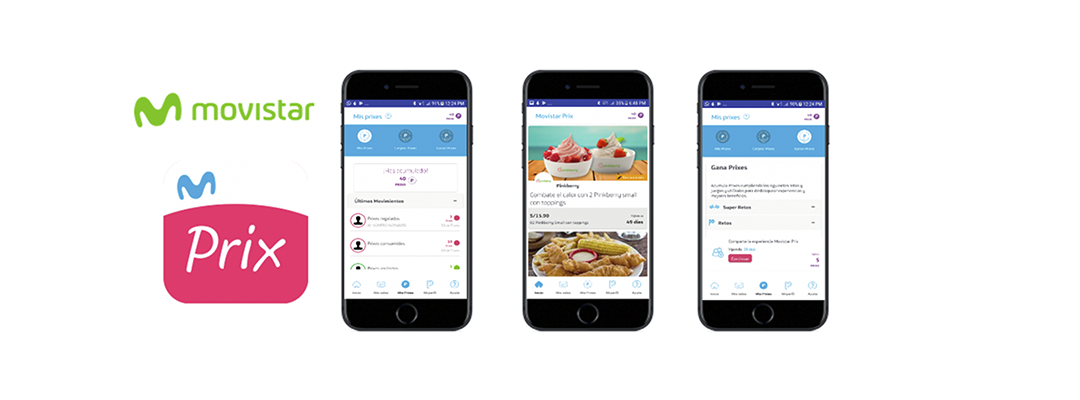
3. Movistar Chile eCommerce
With a cutting-edge user experience and multilevel advantages to business users, this digital service can significantly and positively boost connectivity and success, as well as focusing on real time, sustainability, and integration.
www.movistar.cl is an eCommerce built under an Agile methodology, with a rich and powerful user experience and full responsive design. With a cross-selling and up-selling focus, it is built on sustainable foundations.
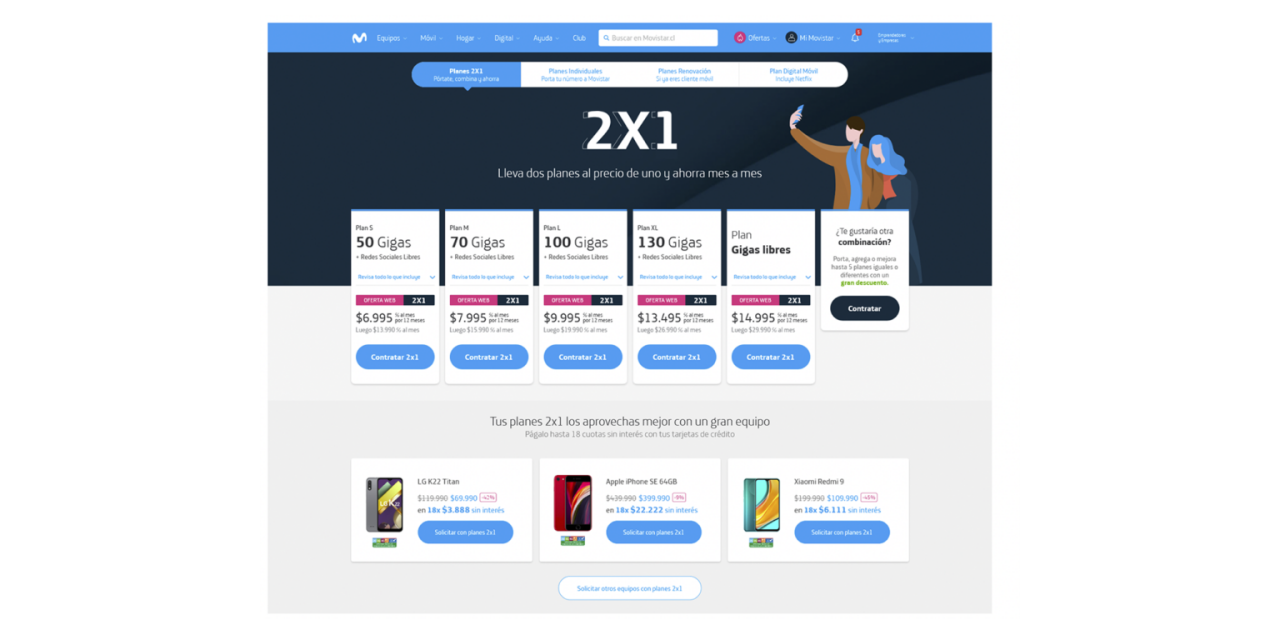
4. Personalization engine
A DMP solution displays the most personalized offers for each customer on Vodafone’s various digital channels: paid media, earned media and owned media.
Based on the best usability and powerful design, Vodafone delivers marketing campaigns using responsive landings pages and microsites, where users can receive the best next offer for them maximizing the whole relationship with Vodafone brand.

5. New Digital Channels for Experience and Sales
TV has also become an essential channel for operators in their engagement with customers. We can see how the “Living App” platform is being implemented on TV. For example, a customer can access a Samsung showroom and check for available offers and click to like or dislike. Favourites can be viewed at any time and the complete purchase completed.

DIGITAL CHANNELS BLUEPRINT Customer Experience Optimization
Predictive analytics enables to decisively forecast clients’ needs, at times, even before the individual has made up their mind. To this end, we offer pre-built, ready-to-use components that cover the most frequent telecommunications company interactions and customer journeys.
This creates an easy, direct, emotional and comprehensive customer experience, as users can access a quick checkout or have a guided selling, depending on which stage of the process they are. By testing different user experiences, we gather insights from the users for optimization.
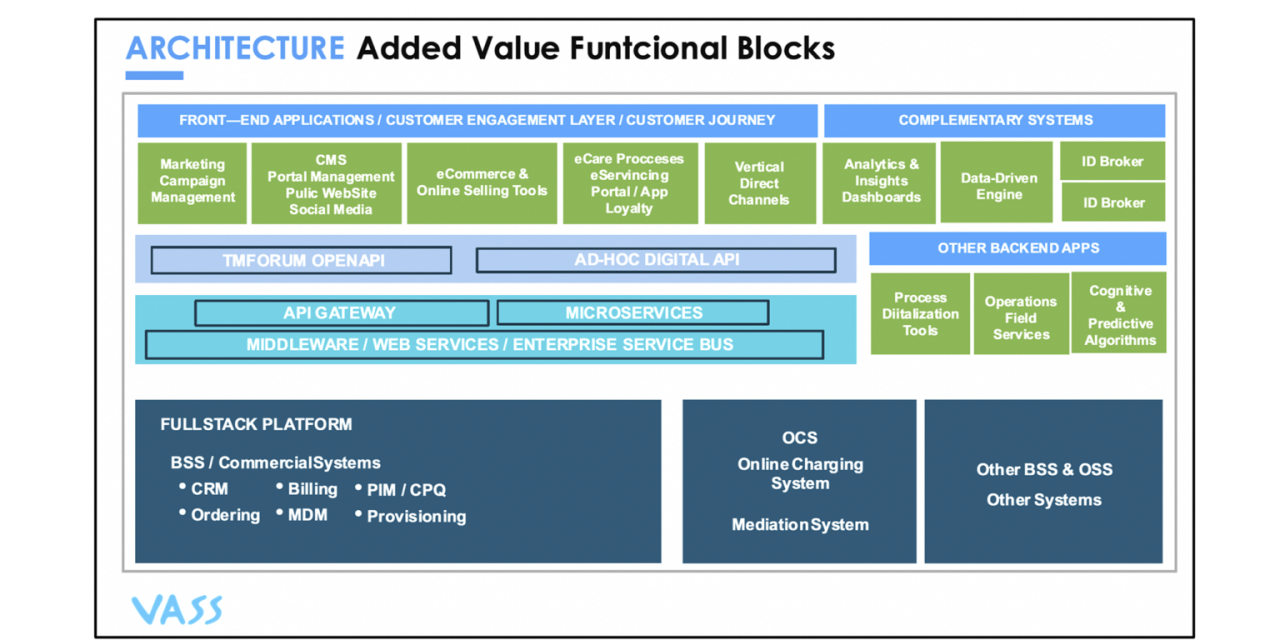
How does VASS help operators deliver these experiences to their customers?
In order for operators to add value to their customers, it is essential for them to know who each customer as well as to segment and customise their customer journey. In this context, we refer to hyper-personalisation techniques and how to ensure that they do not impact operating costs that affect the business model.
To mention a real case, at VASS, we have carried out a successful project with one of the leading Spanish operators where thanks to the personalisation and segmentation carried out, we have managed to improve conversion rates between 500 and 800 per cent in the contracting processes on the part of customers. n other words, exponential improvements are achieved when the customer is treated, knowing who they are and making them see the reason why they are being offered a specific product or service and not another.


 Facebook
Facebook
 X
X
 Linkedin
Linkedin